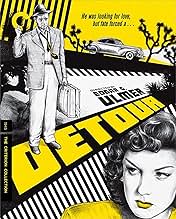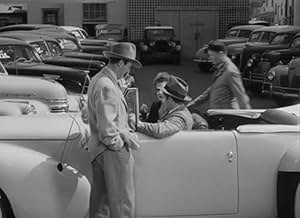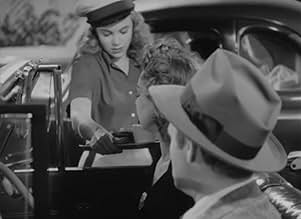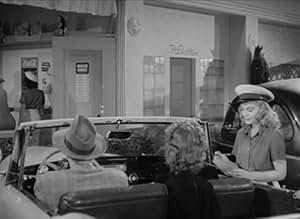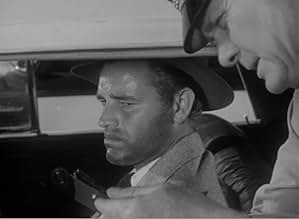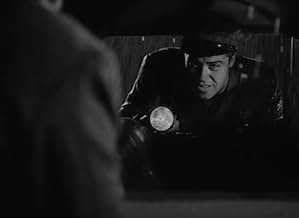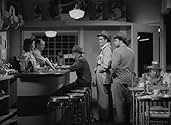CALIFICACIÓN DE IMDb
7.3/10
21 k
TU CALIFICACIÓN
El azar atrapa al autoestopista Al Roberts en una trama noir.El azar atrapa al autoestopista Al Roberts en una trama noir.El azar atrapa al autoestopista Al Roberts en una trama noir.
- Premios
- 1 premio ganado en total
Don Brodie
- Used Car Salesman
- (sin créditos)
Roger Clark
- Cop
- (sin créditos)
Eddie Hall
- Tony - Used-Car Lot Mechanic Inspecting Car
- (sin créditos)
Harry Mayo
- Nightclub Patron
- (sin créditos)
Harry Strang
- California Border Patrolman
- (sin créditos)
Opiniones destacadas
8dxia
One recurrent thought passes through my mind as I watch "Detour." It is that I do not believe a single moment of its story-telling. It isn't because of the incredible coincidences or the bitter irony but because of the simple goodness of the main character. Characters in film noir are not role models or good people placed into bad circumstances. They are bad people who believe that they're good.
The characters in "Double Indemnity," "Body Heat," or "The Talented Mr. Ripley" do not think of themselves as bad people. They believe they are forced into their crimes by the world, which is the essential difference between crime movies and noir. As pointed out by Roger Ebert: "the bad guys in crime movies know they're bad and want to be, while a noir hero thinks he's a good guy who has been ambushed by life."
"Detour" is told through the central character, Al Roberts, who recalls his story as one made through impossible coincidences and horrible luck. But there is something not right about his story. The audience can pick out the incongruities and flaws as soon as they're told. Was Charles Haskell's death really the result of bad luck or simply a murderer trying to convince himself that it was? We wonder if it is possible that a person as innocent as Al says he is can be forced into such immoral activities. However, the explanation is quite clear. Al is retelling the story not as a true confession but as a man reviewing his defense to the police.
Watching the movie, I was reminded of Tanazaki's "The Key," a novel in which the main character deliberately lies to the audience as a way of reaching the story's conclusion. We do not see a real conclusion to "Detour," but we sense that the police will find the same flaws in Al's story as we do. And that is not a fatal form of story-telling but a way of looking into the mind of a true noir character and seeing the darker depths of his soul. That is why film noir is so haunting and why this movie is so definitive in its genre.
The characters in "Double Indemnity," "Body Heat," or "The Talented Mr. Ripley" do not think of themselves as bad people. They believe they are forced into their crimes by the world, which is the essential difference between crime movies and noir. As pointed out by Roger Ebert: "the bad guys in crime movies know they're bad and want to be, while a noir hero thinks he's a good guy who has been ambushed by life."
"Detour" is told through the central character, Al Roberts, who recalls his story as one made through impossible coincidences and horrible luck. But there is something not right about his story. The audience can pick out the incongruities and flaws as soon as they're told. Was Charles Haskell's death really the result of bad luck or simply a murderer trying to convince himself that it was? We wonder if it is possible that a person as innocent as Al says he is can be forced into such immoral activities. However, the explanation is quite clear. Al is retelling the story not as a true confession but as a man reviewing his defense to the police.
Watching the movie, I was reminded of Tanazaki's "The Key," a novel in which the main character deliberately lies to the audience as a way of reaching the story's conclusion. We do not see a real conclusion to "Detour," but we sense that the police will find the same flaws in Al's story as we do. And that is not a fatal form of story-telling but a way of looking into the mind of a true noir character and seeing the darker depths of his soul. That is why film noir is so haunting and why this movie is so definitive in its genre.
Dear Me, PRC, the sub-Republic/Monogram indie studio that was considered the most cardboard of studios managed on this occasion to actually create a deliciously nasty noir. DETOUR, as many commentators here like to spoil for you by telling you THE WHOLE STORY is an excellent low budget film of one man's descent into accidental crime. So powerful are the screen images and the seedy tawdry drama that one almost forgets they are watching one of the cheapest (and profitable) films ever made. Monogram Pictures made several highly appreciated low end noirs (like the truly shocking DECOY of 1946) and must have been very envious of the now enduring $66,000 PRC masterpiece DETOUR. In fact I would not be surprised to find that Monogram were inspired enough to make DECOY as a result. Tom Neal sadly actually went to jail in real life in a genuine DETOUR like way and vicious Ann Savage lived up to her name in a few more noir shockers for various crummy B/W outfits who specialized until the mid 50s in similar films. NARROW MARGIN and KISS ME DEADLY are equals. DETOUR is one of the most rewarding grim descents into 40s desperation film making and the doomed loser played by Tom Neal certainly is the most tragic of them all. This is a great film. It is all it is meant to be and viewers who sit riveted to the unfolding emotional horror are genuinely rewarded. Originally TIFFANY STUDIOS in the 20s the lot became for hire after 1932 then was the home for GRAND NATIONAL from 1935 -39 and morphed into PRC in 1940. With a huge shed of snazzy 20s furniture and sets from the previous 15 years it allowed PRC's budget conscious front office to upgrade their art direction by virtue of all these classy fittings costumes bought and left there by the sophisticated view of those previous managements. I have seen a number of independent B grade30s pix made there with the same sets and outfittings inbetween management reincarnation. PRC in the late 40s were bought up by EAGLE-LION a US/Brit franchise headed by J Arthur Rank and rolled in 1950 into UNITED ARTISTS. As one journalist aptly wrote "No other poverty row outfit were able to cash in their chips so handsomely". Good on 'em! See DETOUR and gasp!!
It's a tribute to Edgar Ulmer that "Detour", made for about thirty thousand dollars, still keeps an interest with new fans who discover it. According to some comments, "Detour" has not been seen in this country in quite a while, but we recall the first time we saw it when it was presented at New York's Film Forum as part of a Film Noir festival in the late eighties. The copy shown recently on TCM has a poor quality, while the print we saw at Film Forum was in better condition.
What makes "Detour" a must see, is the clever way its narrative unfolds on the screen. Al and Sue are seen first in the small bistro he plays the piano and she sings, in Manhattan. Sue sings a happy rendition of "I Can't Believe You're in Love with Me", and Al shows he can improvise on a theme by Chopin as he jazzes it up. When Sue decides to pack it and move to L.A., Tom promises he'll follow. The tragic mistake he makes is to intent crossing the country hitchhiking. Even in the forties, it's a miracle he made it alive!
In Arizona Al meets the kind Charles Haskell, who happens to be going all the way to L.A. and offers him a ride. The two men develop an easy friendship until the point when Haskell dies of an apparent heart attack. Al disposes of the body and keeps going, assuming now, Haskell's persona. At the nearest gas station he sees a pretty woman, Vera, who appears is hitchhiking, and offers her a ride. This will prove to be his biggest mistake.
Vera turned out to be Al's worst nightmare. She knows Al is not Haskell since she, herself, knows the man. Al ends up a virtual prisoner hiding in the apartment they have rented in Hollywood. He can't escape. When Vera realizes there's a lot of money to be made by having Al pretend to impersonate the dead Haskell, he refuses. She threatens to call the police and he is left on the other room pulling the telephone cord...
The film works because all the elements are in place in this satisfying 67 minutes work and because of the great performances Mr. Ulmer got out of Tom Neal and Ann Savage. Edmund MacDonald and Claudia Drake played Haskell and Sue.
"Detour" was shot in two sets and it shows. It's a small film that doesn't pretend what it's not, and that's basically why audiences seem to like it as it's discovered.
What makes "Detour" a must see, is the clever way its narrative unfolds on the screen. Al and Sue are seen first in the small bistro he plays the piano and she sings, in Manhattan. Sue sings a happy rendition of "I Can't Believe You're in Love with Me", and Al shows he can improvise on a theme by Chopin as he jazzes it up. When Sue decides to pack it and move to L.A., Tom promises he'll follow. The tragic mistake he makes is to intent crossing the country hitchhiking. Even in the forties, it's a miracle he made it alive!
In Arizona Al meets the kind Charles Haskell, who happens to be going all the way to L.A. and offers him a ride. The two men develop an easy friendship until the point when Haskell dies of an apparent heart attack. Al disposes of the body and keeps going, assuming now, Haskell's persona. At the nearest gas station he sees a pretty woman, Vera, who appears is hitchhiking, and offers her a ride. This will prove to be his biggest mistake.
Vera turned out to be Al's worst nightmare. She knows Al is not Haskell since she, herself, knows the man. Al ends up a virtual prisoner hiding in the apartment they have rented in Hollywood. He can't escape. When Vera realizes there's a lot of money to be made by having Al pretend to impersonate the dead Haskell, he refuses. She threatens to call the police and he is left on the other room pulling the telephone cord...
The film works because all the elements are in place in this satisfying 67 minutes work and because of the great performances Mr. Ulmer got out of Tom Neal and Ann Savage. Edmund MacDonald and Claudia Drake played Haskell and Sue.
"Detour" was shot in two sets and it shows. It's a small film that doesn't pretend what it's not, and that's basically why audiences seem to like it as it's discovered.
When the pianist Al Roberts gets tired of being miserable and missing his girlfriend who traveled across the country to seek her fortune in Hollywood, he decides to leave New York behind. He has no money to pay for the trip from one coast to the other, so he decides to hitchhike, something that proves to be his downfall. A man who picked him up dies during the journey and Al panics when he pessimistically expects to be accused of the death. He steals not only the man's car, but also his identity and stows away the corpse in a ditch. He then decides to pick up a hitchhiker named Vera, but he will soon regret it because she seems to know his dark secret and will not hesitate to take advantage of it.
The story feels more than a little strained on more than one occasion. It's hard not to fall in love the hopelessness that constitutes Detour. A low-budget thriller directed by Edgar G. Ulmer. Sure, it's an extremely simple B-movie, but it is packed full of interesting quotes, friendly cynicism, pitch black darkness and at least as much rain. It is insanely entertaining to see Vera and Al throw sharp barbs at each other while the tones are so miserable that they find it hard to laugh at them.
With a playing time of over 70 minutes says Detour goodbye long before it has time to start to feel tiring.
The story feels more than a little strained on more than one occasion. It's hard not to fall in love the hopelessness that constitutes Detour. A low-budget thriller directed by Edgar G. Ulmer. Sure, it's an extremely simple B-movie, but it is packed full of interesting quotes, friendly cynicism, pitch black darkness and at least as much rain. It is insanely entertaining to see Vera and Al throw sharp barbs at each other while the tones are so miserable that they find it hard to laugh at them.
With a playing time of over 70 minutes says Detour goodbye long before it has time to start to feel tiring.
Or he is lying. The entire film is told in flashback as Al Roberts (Tom Neal) sits in a dingy diner. At the beginning of his story, Al is a piano player in a low rent club in New York and his best girl is the singer. But then she grows tired of their professional stagnation and decides to go out west and try to get into pictures. Al gets lonely, calls her, and says he is coming out there too. She enthusiastically embraces the idea. He has no car and so he hitchhikes. He gets all of the way to Arizona before his bad luck hits. By the film's end Al has implicated himself in two deaths that were accidents in both cases, but would be impossible to prove they were not murder, and is held prisoner by a dragon lady who wants to get him involved in a preposterous fraud scheme that he rightly decries as being impossible to pull off.
The acting and much of the dialogue is very melodramatic, bordering upon soapy, but it fits the story as so much of it involves conveying the emotion and doing so from the point of view of Al. Bogart and Mitchum wouldn't have been right for this lead role. Either one of them would have come across as either too cool or too tough to put up with such a domineering femme fatale as Ann Savage's Vera and seem so depressed and pathetic. Instead, Tom Neal is perfect as a guy who sees himself bound by fate and doomed.
But maybe the entirety of the story is made up. Al's voice over could just be him sitting in the cafe creating an alibi story. Ann Savage's performance as Vera was over the top maybe because it's Al telling the story, and he wants to make himself look good. I don't buy half of what he tells us; I think he was much more complicit in all of the deaths than he wants the audience to believe. Vera is a caricature of the noir femme fatale because he's trying to convince us that everything was her idea or an accident or fate based on his act of true love - trying to get to his girl in California - and he's completely innocent.
On the technical side, this one showed a great use of light, shadows, and music, and fine direction by Ulmer to keep the mood. It's too bad nobody has restored this one as it resides in the public domain. This is one noir that will stay with you.
The acting and much of the dialogue is very melodramatic, bordering upon soapy, but it fits the story as so much of it involves conveying the emotion and doing so from the point of view of Al. Bogart and Mitchum wouldn't have been right for this lead role. Either one of them would have come across as either too cool or too tough to put up with such a domineering femme fatale as Ann Savage's Vera and seem so depressed and pathetic. Instead, Tom Neal is perfect as a guy who sees himself bound by fate and doomed.
But maybe the entirety of the story is made up. Al's voice over could just be him sitting in the cafe creating an alibi story. Ann Savage's performance as Vera was over the top maybe because it's Al telling the story, and he wants to make himself look good. I don't buy half of what he tells us; I think he was much more complicit in all of the deaths than he wants the audience to believe. Vera is a caricature of the noir femme fatale because he's trying to convince us that everything was her idea or an accident or fate based on his act of true love - trying to get to his girl in California - and he's completely innocent.
On the technical side, this one showed a great use of light, shadows, and music, and fine direction by Ulmer to keep the mood. It's too bad nobody has restored this one as it resides in the public domain. This is one noir that will stay with you.
¿Sabías que…?
- TriviaWhile the crew was setting up to film a hitchhiking scene, a passing car tried to pick up Ann Savage (made up to look dirty and disheveled), causing the crew to break out laughing.
- ErroresIn the first shots of Al hitchhiking, the film is reversed. The cars are driving on the wrong side of the highway and the drivers sitting behind the wheel are sitting on the right side of their vehicles.
- Citas
Al Roberts: Money. You know what that is, the stuff you never have enough of. Little green things with George Washington's picture that men slave for, commit crimes for, die for. It's the stuff that has caused more trouble in the world than anything else we ever invented, simply because there's too little of it.
- ConexionesEdited into Esto es todo (2009)
- Bandas sonorasI Can't Believe That You're in Love with Me
(uncredited)
Written by Jimmy McHugh and Clarence Gaskill
Performed by Claudia Drake
Played often in the score
Selecciones populares
Inicia sesión para calificar y agrega a la lista de videos para obtener recomendaciones personalizadas
Detalles
- Fecha de lanzamiento
- País de origen
- Sitios oficiales
- Idioma
- También se conoce como
- Detour
- Locaciones de filmación
- 9263 Sierra Highway, Actis, California, Estados Unidos(Vera hitchhiking at Richfield gas station called Actis Service Station)
- Productora
- Ver más créditos de la compañía en IMDbPro
Taquilla
- Presupuesto
- USD 30,000 (estimado)
- Total en EE. UU. y Canadá
- USD 16,172
- Fin de semana de estreno en EE. UU. y Canadá
- USD 5,127
- 2 dic 2018
- Total a nivel mundial
- USD 16,172
- Tiempo de ejecución
- 1h 6min(66 min)
- Color
- Relación de aspecto
- 1.37 : 1
Contribuir a esta página
Sugiere una edición o agrega el contenido que falta

![Ver Trailer [OV]](https://m.media-amazon.com/images/M/MV5BZGEyYTUwNDQtN2ZjZi00YmY2LWE2ZjUtOTY3NjQ3NDQ0Zjg3XkEyXkFqcGdeQXRyYW5zY29kZS13b3JrZmxvdw@@._V1_QL75_UX500_CR0)
